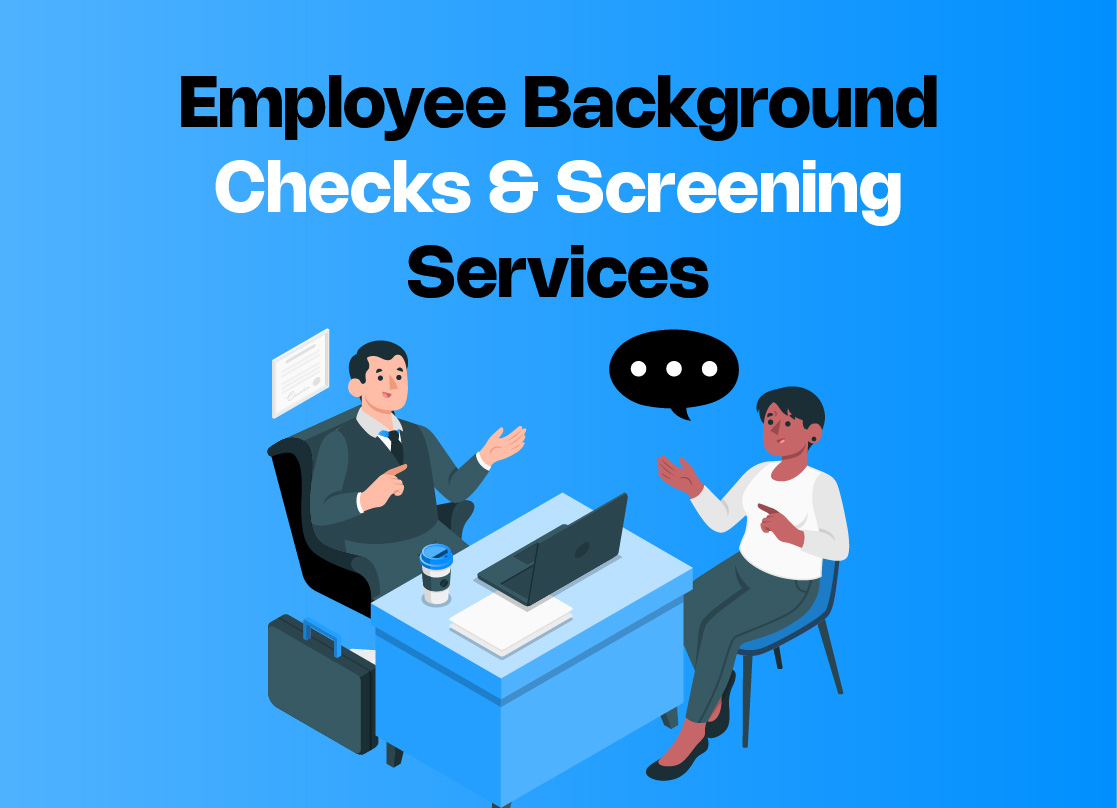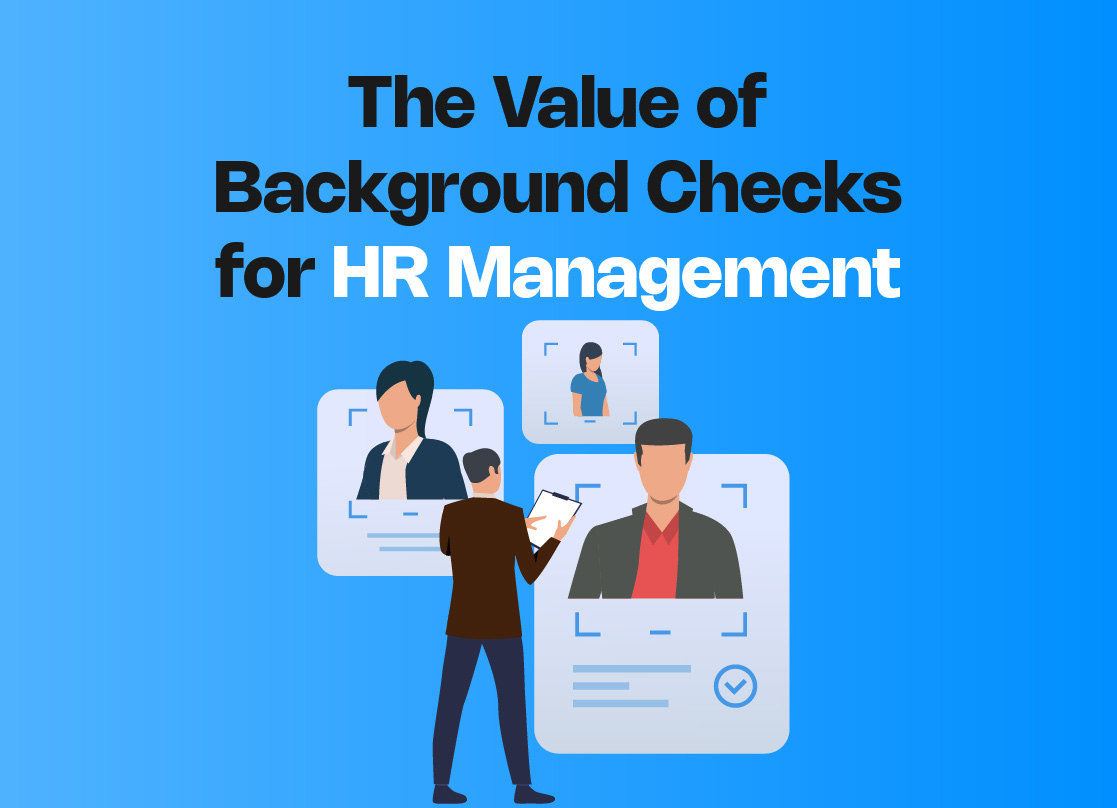
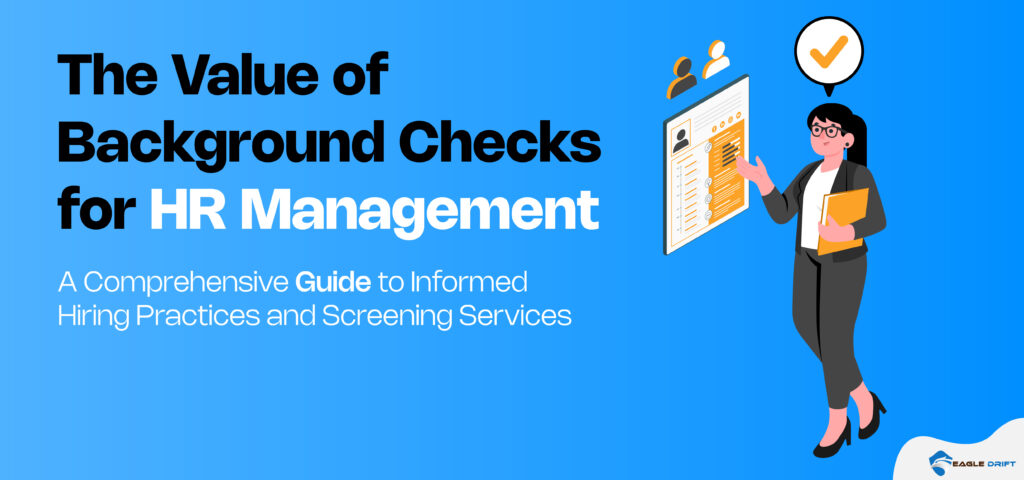
In the fast-paced world of Human Resources (HR) management, making informed hiring decisions is crucial. The background check is one tool that stands out in ensuring a thorough understanding of potential hires. Let’s delve into the definition, importance, and various types of background checks that contribute to effective HR management.
Before we explore the intricacies of HR management and background checks, it’s essential to understand what background checks entail. These comprehensive investigations involve scrutinizing an individual’s history, covering aspects like criminal records, employment history, and financial stability.
Effective HR management hinges on recruiting trustworthy and competent individuals. Background checks play a pivotal role in achieving this by providing valuable insights into a candidate’s past, and helping employers make informed decisions that align with the organization’s goals.
Types of Background Checks
HR Background Check
Definition of HR Background Check:
An HR background check refers to the process of thoroughly examining a candidate’s professional and personal history before making a hiring decision. It involves assessing qualifications, and work experience, and other relevant aspects to ensure a candidate is suitable for a particular job.
Importance of HR Background Check:
The HR background check is crucial for mitigating risks associated with hiring. It helps organizations make informed decisions, ensuring that candidates possess the required skills, qualifications, and have a clean record, thereby reducing the chances of potential workplace issues.
Types of HR Background Check:
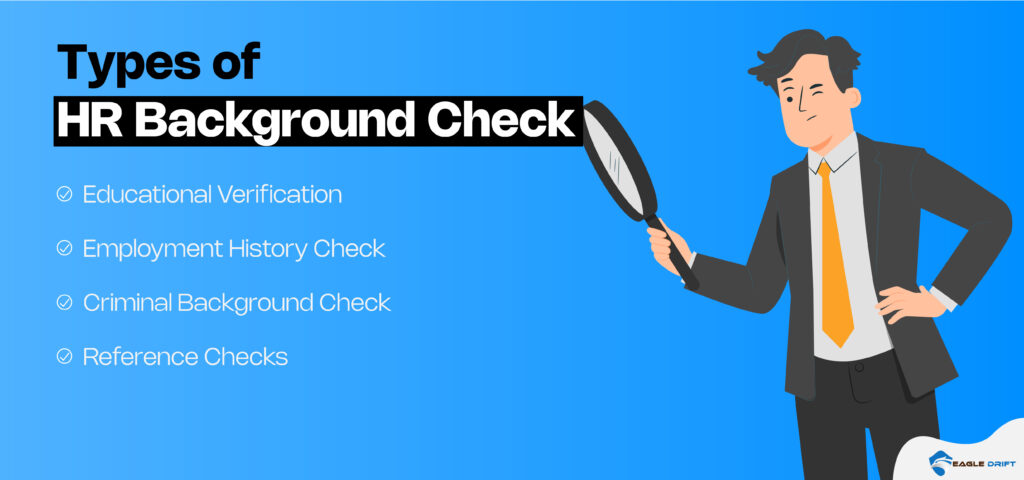
- Educational Verification: Confirming the authenticity of academic credentials and degrees.
- Employment History Check: Verify a candidate’s work history and confirm details of past employment.
- Criminal Background Check: Examining a candidate’s criminal record to assess potential risks to the workplace.
- Reference Checks: Contact previous employers or professional references to gather insights into a candidate’s work ethic and performance.
Employment Verification Background Check
Definition of Employment Verification Background Check:
Employment verification background checks involve confirming the accuracy of a candidate’s employment history, including job titles, dates of employment, and reasons for leaving previous positions.
Importance of Employment Verification Background Check:
This type of background check ensures that candidates have provided truthful information about their work history. It helps employers make reliable decisions and avoid potential issues related to falsified resumes.
Types of Employment Verification Background Check:
- Confirmation of Employment Dates: Verifying the start and end dates of a candidate’s previous employment.
- Job Title Verification: Confirm the accuracy of the candidates’ job titles in previous positions.
- Reason for Leaving: Investigating the reasons provided by the candidate for leaving previous roles.
Business Background Check
Definition of Business Background Check:
A business background check involves evaluating the financial stability, reputation, and overall health of a business entity. This type of check is often conducted when forming partnerships, collaborations, or engaging in significant business transactions.
Importance of Business Background Check:
Business background checks are essential for assessing the reliability and credibility of potential business partners. They help avoid partnerships with entities that may pose financial or reputational risks.
Types of Business Background Check:
- Financial Stability Check: Assessing the financial health of a business through analysis of financial statements and credit reports.
- Reputation Assessment: Examining the business’s reputation in the market by checking reviews, client feedback, and industry reports.
- Legal History Check: Investigate any legal issues, lawsuits, or regulatory violations associated with the business.
- Ownership Verification: Confirming the legal ownership structure and key business stakeholders.
Best Employee Background Check Services Providers
Overview of Best Employee Background Check Services Providers
When it comes to employee background check services, several providers stand out for their reliability, comprehensive offerings, and industry reputation. These services play a crucial role in helping employers make informed hiring decisions while ensuring legal compliance and safeguarding their workforce.
Overview of Best Employee Background Check Services Providers:
- Sterling Check: Known for its advanced technology and extensive background screening services, Sterling Check offers solutions tailored to various industries, including healthcare, finance, and technology.
- GoodHire: GoodHire is recognized for its user-friendly platform and fast, reliable background checks. They provide various services, including criminal record checks, credit checks, and employment verifications.
- Checkr: Checkr is a popular choice for its modern approach to background checks, leveraging artificial intelligence and machine learning to streamline the screening process. It’s particularly well-regarded for its quick turnaround times.
- HireRight: With a global presence, HireRight is known for its comprehensive suite of background screening services, including criminal background checks, drug testing, and identity verification.
Comparison between Different Best Employee Background Check Services Providers:
- Technology Integration: Evaluate how well each provider integrates with your existing systems and whether they offer API capabilities for seamless integration.
- Compliance: Assess the providers’ adherence to legal regulations and industry standards to ensure your background checks meet all necessary requirements.
- Turnaround Time: Compare the speed at which each provider delivers results, as quick turnaround times are often crucial for the hiring process.
- Customer Support: Consider the level of customer support each provider offers, including responsiveness and assistance with any issues or inquiries.
Background Check Services for Employers
Overview of Background Check Services for Employers:
Background check services for employers are essential for maintaining a safe and productive work environment. These services typically include criminal record checks, employment verification, and credit checks, and more.
Comparison between Different Background Check Services for Employers:
- Scope of Services: Compare the range of services offered by different providers to ensure they meet your specific needs, whether it’s comprehensive background checks or specific screenings.
- Customization: Assess the flexibility and customization options each service provides, allowing you to tailor background checks based on your industry and hiring requirements.
- Cost: Compare pricing structures, considering not only the overall cost but also the value offered in terms of the breadth and accuracy of information provided.
- Reporting Features: Evaluate the reporting capabilities of each service, including the clarity and detail of the information presented, to facilitate informed decision-making.
Choosing the right background check services for employers involves considering these factors to align with your organization’s values, legal obligations, and industry standards.
How Do HR Do Background Checks?
Understanding the intricacies of the background check process is crucial for HR professionals. This section provides insights into the processes involved in HR background checks, employment verification background checks, and business background checks.
Overview of the HR Background Check Process
Definition and Importance of the HR Background Check Process:
The HR background check process is a systematic examination of a candidate’s professional and personal history to assess their suitability for a specific job. This process is crucial for ensuring that organizations hire qualified and trustworthy individuals, reducing the risks associated with potential workplace issues.
Steps Involved in the HR Background Check Process:
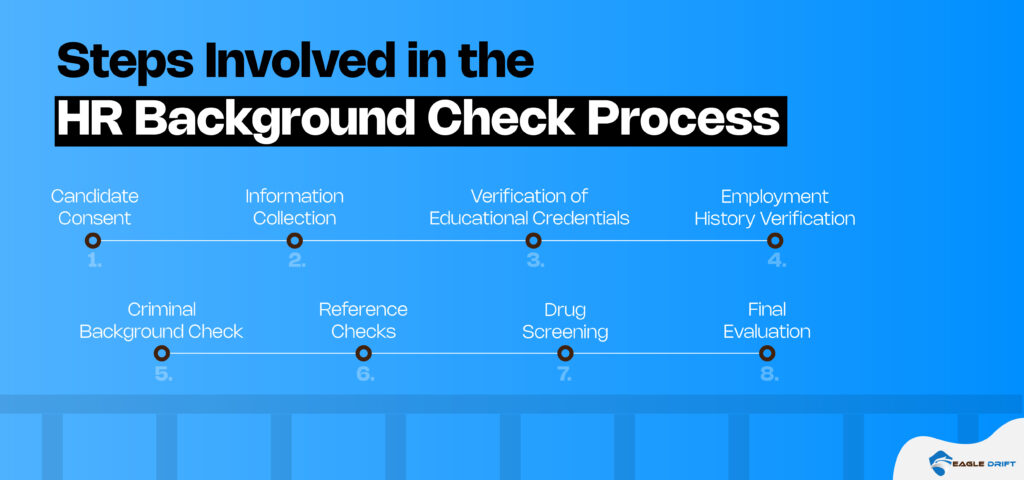
- Candidate Consent: Obtain the candidate’s consent to conduct a background check, ensuring compliance with legal requirements.
- Information Collection: Gather essential information from the candidate, including personal details, educational and employment history.
- Verification of Educational Credentials: Confirm the authenticity of the candidate’s educational qualifications through direct contact with educational institutions.
- Employment History Verification: Verify the accuracy of the candidate’s work history by contacting previous employers and confirming job titles, dates of employment, and reasons for leaving.
- Criminal Background Check: Conduct a criminal background check to identify any criminal history that may pose a risk to the workplace.
- Reference Checks: Contact professional references provided by the candidate to gain insights into their work ethic, skills, and performance.
- Drug Screening: In some cases, organizations may include drug screening as part of the background check process, especially in industries where it is relevant.
- Final Evaluation: HR professionals assess the gathered information to make informed decisions about the candidate’s suitability for the position.
Overview of the Employment Verification Background Check Process
Definition and Importance of the Employment Verification Background Check Process:
The employment verification background check process involves confirming the accuracy of a candidate’s employment history details, such as job titles, dates of employment, and reasons for leaving. This process is crucial for ensuring the candidate’s honesty and integrity in representing their work experience.
Steps Involved in the Employment Verification Background Check Process:
- Candidate Consent: Obtain the candidate’s consent to conduct an employment verification background check.
- Information Collection: Collect detailed information about the candidate’s past employment, including company names, job titles, and dates of employment.
- Contact Previous Employers: Reach out to the candidate’s previous employers to verify the information provided, including job responsibilities, performance, and reasons for leaving.
- Verification Documentation: Collect and document verification responses from previous employers to maintain a comprehensive record.
- Reporting: Compile the verified employment history into a report for HR and hiring managers to assess the candidate’s suitability for the position.
Overview of the Business Background Check Process
Definition and Importance of the Business Background Check Process:
The business background check process involves evaluating the financial stability, reputation, and legal history of a business entity. This process is essential for individuals and organizations entering into partnerships, collaborations, or significant business transactions to mitigate potential risks.
Steps Involved in the Business Background Check Process:
- Business Information Collection: Gather detailed information about the business, including its legal structure, ownership, and key stakeholders.
- Financial Analysis: Assess the financial stability of the business through the examination of financial statements, credit reports, and other relevant financial data.
- Reputation Assessment: Investigate the business’s reputation in the market by analyzing reviews, client feedback, and industry reports.
- Legal History Check: Examine any legal issues, lawsuits, or regulatory violations associated with the business.
- Reporting: Compile the findings into a comprehensive report, providing a clear overview of the business’s background for informed decision-making.
The business background check process is instrumental in ensuring that businesses engage in relationships that align with their values and objectives while minimizing potential risks.
Background Screening Report and Level 3 Background Check Process
A crucial aspect of background checks is the generation of detailed reports. This section sheds light on the background screening report process and the intricate steps involved in conducting a level 3 background check.
Overview of the Background Screening Report Process and Level 3 Background Check Process
Definition and Importance of the Background Screening Report Process:
The background screening report process involves the comprehensive examination of an individual’s history, including education, employment, criminal record, credit history, and other relevant information. This process is crucial for employers and organizations to make informed decisions during the hiring process, ensuring the safety and integrity of the workplace.
Steps Involved in the Background Screening Report Process:
- Candidate Authorization: Obtain written consent from the candidate to conduct a background screening, ensuring compliance with legal requirements.
- Data Collection: Gather information provided by the candidate, including personal details, education history, employment history, and other relevant data.
- Verification Checks:
- Educational Verification: Confirm the authenticity of academic credentials by contacting educational institutions.
- Employment Verification: Verify the accuracy of the candidate’s work history by contacting previous employers.
- Criminal Background Check: Conduct a thorough check of criminal records at local, state, and federal levels.
- Credit History Check (if applicable): Assess the candidate’s credit history, especially relevant for positions involving financial responsibilities.
- Reference Checks: Contact professional references provided by the candidate to gain insights into their work ethic and performance.
- Drug Screening (if applicable): Some industries or positions may require drug testing as part of the background screening process.
- Reporting: Compile all verified information into a comprehensive background screening report, providing a detailed overview for employers to evaluate.
Definition and Importance of the Level 3 Background Check Process:
A Level 3 Background Check is an advanced screening process that goes beyond standard checks and may include fingerprinting and a more in-depth analysis of an individual’s history. This level of screening is often required for positions with high security or public trust implications.
Steps Involved in the Level 3 Background Check Process:
- Candidate Consent: Obtain explicit consent from the candidate for a Level 3 Background Check, explaining the necessity and extent of the screening.
- Fingerprinting: Collect fingerprints from the candidate, which are then submitted for analysis to national databases.
- Extended Criminal History Check: Conduct a comprehensive examination of the candidate’s criminal history at local, state, and federal levels.
- Security Clearance (if applicable): Initiate the process for obtaining necessary security clearances required for specific roles.
- In-Depth Reference Checks: Conduct more extensive reference checks, reaching out to colleagues, supervisors, and other associates for a thorough assessment.
- Regulatory Compliance Check: Ensure adherence to industry-specific regulations and compliance standards relevant to the position.
- Reporting: Compile the findings into a detailed Level 3 Background Check report, providing a comprehensive overview of the candidate’s background, suitability, and potential risks.
Both the background screening report process and the Level 3 Background Check process are critical tools in the hands of employers to make well-informed decisions, particularly for roles where security, public trust, or regulatory compliance is paramount.
Conclusion
In conclusion, employee background checks are an indispensable component of the hiring process, serving to ensure the integrity, safety, and compliance of an organization. The significance of these checks lies in their ability to mitigate risks, verify qualifications, and make informed hiring decisions. A comprehensive approach to background screening involves various types of checks and services tailored to different aspects of a candidate’s background and the needs of the business.
The importance of conducting thorough background checks includes not only risk mitigation but also the protection of a company’s reputation and the establishment of a trustworthy work environment. Legal compliance is paramount, and background checks help organizations adhere to regulatory standards, reducing the likelihood of legal issues associated with hiring.
Various types of background checks, such as HR background checks, employment verification checks, and business background checks, offer a nuanced understanding of a candidate’s history and suitability for a role. Additionally, processes like background screening reports and Level 3 background checks provide a more in-depth analysis, especially for positions with high security or public trust implications.
As organizations strive for informed decision-making in their hiring practices, the judicious use of these background checks ensures that the workforce is not only qualified but also aligns with the values and safety standards of the company. In an ever-evolving professional landscape, the investment in robust background screening processes remains a fundamental step in building and maintaining a successful and secure workplace.
FAQs
What can you expect from an employee background check?
An employee background check typically includes verification of educational and employment history, a criminal background check, reference checks, and, in some cases, a credit check. Employers aim to confirm the accuracy of information provided by candidates, ensuring a candidate’s qualifications, and assessing potential risks to the workplace.
What is background screening?
Background screening is a process of investigating and verifying an individual’s history, typically conducted by employers during the hiring process. It involves checks on educational and employment history, criminal records, credit history, and other relevant information to assess a candidate’s suitability for a specific position.
Why are pre-employment background checks important?
Pre-employment background checks are crucial for several reasons. They help employers make informed hiring decisions, mitigate potential risks to the workplace, verify qualifications, ensure legal compliance, and protect the reputation of the organization. These checks contribute to creating a safe and productive work environment.
What information can background screening provide for the employer?
Background screening can provide employers with a range of information, including:
- Verification of educational qualifications and degrees.
- Confirmation of employment history, including job titles and dates of employment.
- Criminal history checks to identify any potential risks.
- Credit history checks for positions involving financial responsibilities.
- Reference checks to gather insights into a candidate’s work ethic and performance.
How does a background check work?
A background check typically begins with obtaining the candidate’s consent. The employer or a third-party screening service then collects relevant information from the candidate, such as personal details, educational and employment history. The process involves verifying this information through direct contact with educational institutions, previous employers, and other sources. Different checks, such as criminal background checks or credit checks, may be conducted based on the requirements of the position. The results are compiled into a comprehensive report, allowing employers to make informed decisions during the hiring process.


